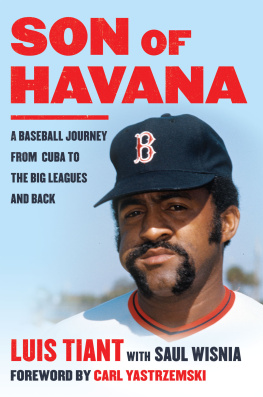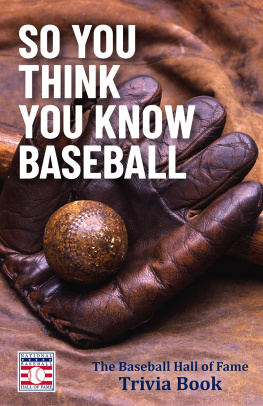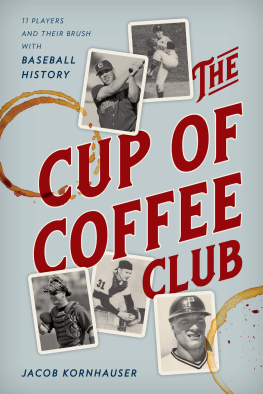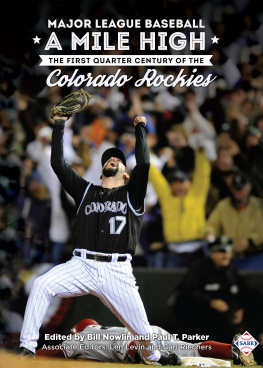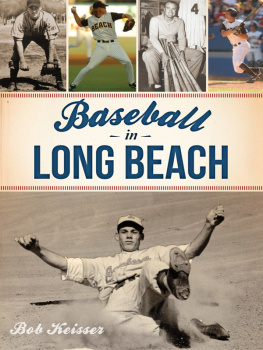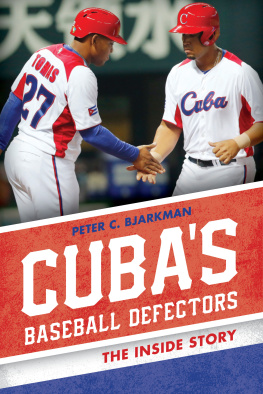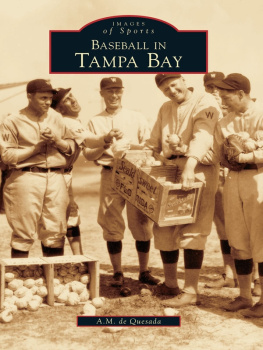

To Maria, my best friend and partner on this long journey of nearly 60 years.
Luis Tiant
To Michelle, with love and a promise: it really is done.
Saul Wisnia
Copyright 2019 by Luis Tiant with Saul Wisnia
All rights reserved, including the right to reproduce this book or portions thereof in any form whatsoever.
For more information, email
Diversion Books
A division of Diversion Publishing Corp.
443 Park Avenue South, suite 1004
New York, NY 10016
www.diversionbooks.com
First Diversion Books edition May 2019
Hardcover ISBN: 978-1-63576-543-4
eBook ISBN: 978-1-63576-542-7
Printed in The United States of America
1 3 5 7 9 10 8 6 4 2
Library of Congress cataloging-in-publication data is available on file.
Contents

Foreword
I HAVE SAID IT before and Ill always say it: If you wanted one pitcher to start a big game, it would be Luis Tiant. Nobody was a tougher competitoror a better teammate. He meant so much to us, and to the fans. We all loved him.
Luis played for the Indians when I first met him. He threw real hard, in the mid-nineties. The mound was higher then, and he pitched up; he had a good breaking ball and a rising fastball.
He threw that rising fastball a lot, and one Saturday afternoon at Fenway Park in May 1967 he struck me out three times. After the game I was taking [extra] batting practice, so of course he had to walk out on the field and get my attention. I looked over at him, and he just said one thing:
You need it.
That was Luis. Even when you werent his teammate, you knew he was a funny guy. He seemed to have nicknames for everyone. Hed call me Polack with his crazy Cuban accent and Id just laugh. You couldnt get mad at him.
About a month later at Fenway, I faced him again and hit a home run. As I was rounding the bases, he turned to me yelling, You dumb Polack! I was laughing, and yelled back, You big Black Cuban! Then he came up to me the next day and said, I guess the batting practice paid off.
When the Red Sox picked Luis up in 1971 he was coming off a bad shoulder, but I thought if his arm came around he could help us. He was smart, had great control, and knew how to pitch. Even if he had lost a little something on his fastball, I felt he could rely on his pitching knowledge to get guys out.
That first year, he was still hurting, but in 72 his arm was sound. He was just outstanding that summer, nearly pitching us to a pennant, and the fans at Fenway Park started in with all the LOO-EEE! LOO-EEE! LOO-EEE! chants. I never heard anything like it, or saw fans react to a ballplayer in that way. It sent chills down my spine. Fans recognize effort, and they knew how hard he had worked to come back. They understood him, and they loved him. It was beautiful.
I think that unique windup he had helped him because it was so herky-jerky. Hed turn his back to the plate, which hid the ball well from batters. With a right-handed hitter, his back would be turned toward them, so they couldnt see the ball at all. Lefties like me could pick the ball up a little quicker, but it was still tough. That was a big part of his success.
Luis was great under pressure, especially in the 75 postseason. When he pitched the way he did in the first game of the American League Championship Series, beating Oakland, it gave us all a big lift. We had just lost Jim Rice to a broken hand, and I know the team was down by not having Jimmy in the lineup. By beating the three-time defending champs, Luis picked us all up.
Then in the World Series, he shut out the Reds in the opener at Fenway and got the big hit to start our winning rally. Game Four at Cincinnati was tougher, because Luis didnt have his best stuff. I can remember Darrell Johnson coming out to the mound in the ninth inning and asking him how he felt, because he had thrown so many pitches. Luis told him he started the game and he was going to finish it.
Thats the way he was; he wasnt looking for any help from the bullpen. And he did finish it, getting us another big win.
When Luiss mom and dad came to Boston from Cuba that summer of 75, after all those years apart from him, it was heartwarming. It not only made the Tiants happy, it made the whole team happy. Especially in that atmosphere in Boston, and the way the fans loved Luis, Im sure it was a huge thrill for his parents. And, of course, they got to see him win those big games.
We loved Luis so much in the clubhouse. He was absolutely hysterical, and always had something to say that was funny. Luis kept the team relaxed with his big Cuban cigars and practical jokes. He was just a very funny, positive person, win or lose.
Thats another thing I always liked about Luis. If he had a bad game, hed say, Yaz, Ill get em next time. That was his attitude. He never got upset. Just Ill get em next time. Maybe deep down, it hurt himIm sure it didwhen he had a bad outing. But he didnt show it. He kept his cool.
I was very surprised about Luis signing with the Yankees as a free agent after 1978, because of the fan loyalty he had in Boston and how much they loved him. He loved Boston too, so it came as a big, big surprise when he went to New York. It was strange to everyone, I think, seeing him in pinstripes, but I understood why he went.
That move had a big impact on our team, beyond wins and losses. I was quoted as saying that When they let Tiant go, they took out our heart and soul. Things were never quite the same, and it hurt us as a unit. Nobody could fill his shoes when it came to keeping guys loose.
Ive always thought that Luis should be in the Hall of Fame. No doubt about it. He has the statistics, and then you include the tremendous games he pitched in tight situations for us. Certainly nobody loved being out there with everything on the line more than Luis did.
To this day, he still calls me Polack. Ill see him at spring training, down in Fort Myers, and hell go, Hiya, Polack, how ya doin?
All you can do is laugh.
Carl Yastrzemski
Boston Red Sox, 196183
National Baseball Hall of Fame
1

Shutting Up Pete Rose
ON A RAINY OCTOBER AFTERNOON in 1975, the right-field bullpen door at Fenway Park swung open and the cheering began. Like a wave of sound, years before anyone had heard of the wave, the capacity crowd stood and screamed for the bow-legged man walking in toward the diamond: LOO-EEE! LOO-EEE! LOO-EEE!
In his bright white polyester uniform, with his thick belly and Fu Manchu mustache, Luis Tiant looked more like a guy rolling out of bed for a Sunday-morning beer league than a professional baseball player. The Cincinnati Reds, the Big Red Machine that had torn through the National League and were prohibitive favorites in this 75 World Series, had not shown Bostons Game One starting pitcher much respect. Pete Rose, the Reds talented leadoff man and spark plug, told reporters he couldnt wait to face Bostons ace right-hander.
Other than a few isolated moments in All-Star games years before, however, Rose and his overconfident teammates had only seen Tiant perform on TV or tape. They underestimated the warrior who had won the hearts of New Englanders with his matador-like demeanor and ability to baffle hitters with an assortment of curves, blooper pitches, and a sneaky-quick fastball. All were delivered from an exaggerated, seemingly impossible high-kicking, spinning windup that further complicated matters for batters.
Next page
